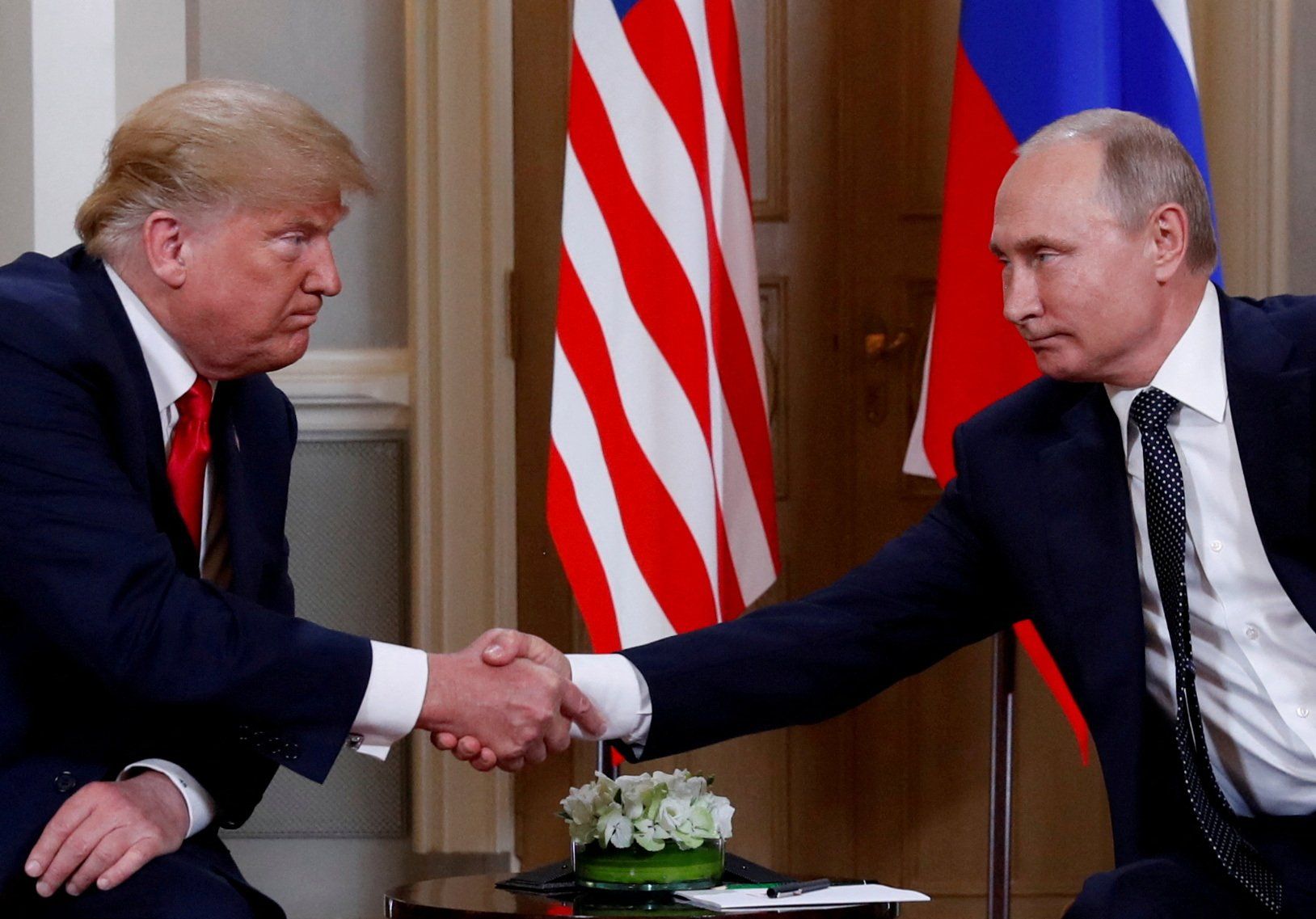When Chamberlain moved into 10 Downing Street, Adolf Hitler’s willingness to ignore international agreements was already apparent, having broken the Versailles treaty with a massive expansion of Germany’s armed forces, the occupation of the Rhineland.
Faced with the prospect of Germany moving on Czechoslovakia, Chamberlain continued to work to appease Hitler by agreeing to territorial concessions in his favour. He believed that by appeasing the Führer, Europe could avoid war and save lives.
Chamberlain’s failure, and the subsequent outbreak of the second world war after Germany’s invasion of Poland in September 1939, are recognised as evidence that the appeasement of expansionist nationalists always fails. Such leaders will simply take all that is offered and demand more.
There are parallels with the relationship between the current US president, Donald Trump, and the Russian president, Vladimir Putin. Trump and his senior officials have also repeatedly suggested that Ukraine should secure a peace deal by acquiescing to Putin’s demands, including for sovereign Ukrainian territory and assurances that Ukraine won’t be allowed to join Nato.
This makes it seem as if Trump believes that peace can be achieved by appeasing Putin. Like Chamberlain at Munich, Trump has suggested offering the sovereign territory of an independent nation to appease a bully.
Trump is not the first American president to make this mistake. Franklin D. Roosevelt, who served between March 1933 and April 1945, also tried to appease Hitler. The historian Frederick W. Marks III notes that “the keynote of his approach … beginning in 1933 was appeasement”.
Before he was inaugurated, Roosevelt sought to persuade Sir Ronald Lindsay, the British ambassador to the US between 1930 and 1939, that Poland should be persuaded to concede the Polish Corridor to Germany. When German troops seized the Rhineland, Roosevelt’s White House made no protest.
Between 1935 and 1937, Roosevelt made speeches condemning autocracy – but his actions did not match his words. In 1938, he appointed the appeaser Joseph Kennedy as US ambassador to the UK. Kennedy assured the German ambassador in London that he “sympathised not only with Germany’s racial policy but also with her economic goals”.
In Berlin, the US ambassador, Hugh Wilson, insisted that defence of Czechoslovakia’s borders would be unrealistic. The Czechs should surrender the Sudetenland to Germany. Roosevelt continued his efforts to arrange a compromise peace when German forces seized Poland in September 1939.
Echoes of the past
The parallels continue. Confronted by Russia’s invasion of its democratic neighbour and relentless attacks on Ukrainian towns and cities, Trump’s response, shortly after taking office, was to bully the Ukrainian president, Volodymyr Zelensky, and negotiate directly with Russia. This approach signally failed and the killing continued and even intensified.
Now, following his two-hour conversation with Putin on Monday, Trump has abandoned his insistence on an unconditional 30-day ceasefire. He now insists that the war is not his to fix. The US will step back. It is another hard blow to Ukrainian hopes for negotiation and compromise.
To a much greater extent than Roosevelt, Trump appears to treat weakness as evidence of moral inadequacy. In a recent essay, Ivan Mikloš, the former deputy prime minister of Slovakia who has advised successive Ukrainian governments in various capacities, writes of what he sees as Trump’s “affinity for the Kremlin boss”. Miklos believes that Trump admires Putin, and concludes that:
President Putin, of course, sees that Mr Trump has a soft spot for him. This does not deter him in his maximalist demands, it encourages him even more.
The US president’s treatment of Zelensky in the Oval Office at the end of February, and repeated statements since, suggest he lacks the patience for diplomacy – a concern that has been widely reported. Trump is said to admire Putin because the Russian president exercises power with minimal restraint.
Meanwhile, Zelensky must plead for the military and financial support he requires to continue fighting a foe with a population four times larger.
Lessons from history
There is scant evidence that Trump pays attention to history. He should, because for Putin, history is central to strategy. A graduate of law who studied at Leningrad State University, graduating in 1975, Putin appears to have embraced an idealist version of his homeland as it operated in his youth as the Soviet Union – under the hardline leadership of Leonid Brezhnev, Yuri Andropov and Konstantin Chernenko.
That Soviet Union included all of the territory of modern Ukraine. Putin aspires to recapture it. His vision is a Russia restored to a status comparable to that of the Soviet Union during the cold war years of his youth.
Trump appears to forget that throughout the cold war, the Soviet Union’s powerful armed forces and ideological hostility to democracy cost the US an average of 3.6% of its GDP in defence spending each year. It’s one thing for Trump to demand that the European members of Nato must increase their defence budgets. It’s another to imagine that Nato can immediately provide a reliable deterrent to Russian aggression without US involvement.
Trump’s newly appointed defense secretary, Pete Hegseth, suggested at a meeting of the Ukraine Defence Contact Group in Brussels in February that the US would reorientate its security policy away from Europe, saying Europe must “take ownership of conventional security on the continent”.
This is essential, Hegseth said, because China is the real threat, and the US lacks the military resources to face in two directions simultaneously. It was a confession of weakness that places both America and Europe at increased risk.
The philosopher George Santayana is credited with the warning: “Those who cannot remember the past are condemned to repeat it.”. Chamberlain’s version of appeasement failed to prevent Adolf Hitler’s aggression in the 20th century. Trump’s version appears equally incapable of deterring Vladimir Putin’s territorial ambitions in the 21st.
Tim Luckhurst, Principal of South College, Durham University
This article is republished from The Conversation under a Creative Commons license. Read the original article.
